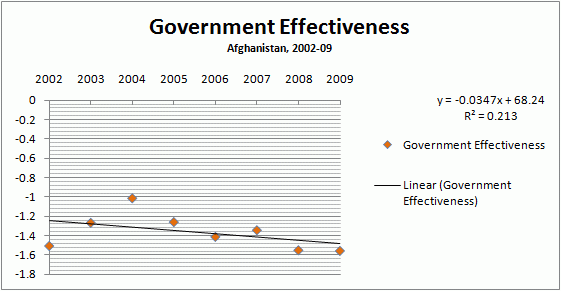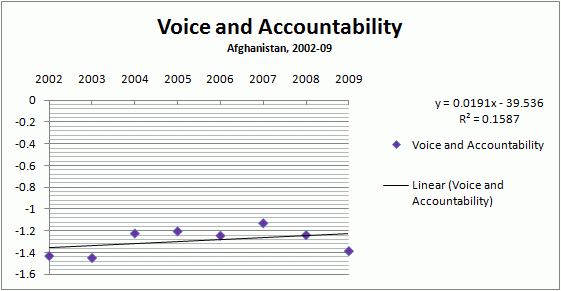Feds should stick to their guns on ending Afghanistan mission in 2011
October 5, 2010 2 Comments
 Should we stay or should we go?
Should we stay or should we go?
It’s a question concerning the Canadian military mission in Afghanistan that has been the subject of much debate over the past few years.
The question has taken up a new urgency recently amid news reports of:
- A U.S. commander criticizing the Canadian government’s reluctance to authorize an extension beyond the planned 2011 withdrawal date
- Calls by the families of slain Canadian soldiers for the Harper government to extend the Afghanistan mission beyond 2011
- And a poll suggesting that there is little public support for extending the mission
It would be tempting to say that Canada should extend its mission in Afghanistan if there was solid and convincing evidence that Afghanistan was on the right track and close to a turnaround that would firmly establish it as a stable democracy under the rule of law.
But then there are the World Bank’s Worldwide Governance Indicators, which paint a picture of an Afghanistan that almost certainly faces a grim future with or without us.
Of the six indicators tracked by the World Bank, only two have shown a mildly positive trendline since 2002 — Voice and Accountability and Regulatory Quality. This suggests very modest improvements on these fronts, but even here Afghanistan still faces decades to come of poor scores in the World Bank’s reports, even under the best of circumstances.
Control of Corruption has been better in some years than in others, showing neither a consistent positive trend nor a negative one.
On the other three indicators, it’s all bad news. Government Effectiveness showed some early signs of improvement that were reversed as time went on. Rule of Law has been on a slow but fairly steady downward trend, and Political Stability has been on a more alarming negative trend.






Foreign policy is ultimately an extension of domestic politics. Thus, it is understandable why the fragile Afghan government would prefer that Canada extend its commitment there, why a U.S. administration that already has a load of problems on its hands doesn’t want the Afghanistan file becoming any more complicated than it already is… and why the Harper government here in Canada would sooner put the whole thing behind it and move on.
There’s also the reality that overseas conflicts tend to get more difficult to manage over time, and more exhausting for the “away” team.
In the absence of a compelling case that what we want for Afghanistan can be acquired at a price we are willing to pay, the federal government would be better off to continue with plans for an abrupt departure from Afghanistan in 2011 than to get stuck in a quagmire that leaves both soldiers and citizens burned out.
Related: An excellent analysis of the situation directly from Kandahar

In response to this post I will keep this simple: Kudos!
I do not believe at all that our government would consider extending the war.
Ten years old and dragging on. Not to mention that we are already “pulling out” so to speak, as American Forces slowly take over not only previously held Canadian ground but British ground and other NATO-held ground as well.
Several months ago I began to pen a letter intended for Mr Harper. It never got to him. Deciding I should call the only military man I know who has served two tours and is returning for a third, a two-hour-plus conversation later had me re thinking some things. In the coming days I could not send the letter, and remains the only letter I’ve written to a politician that I have never sent.
The CF I know assured me that our government would not commit to extending the mission again. Though he felt personally that he was doing good work and that he felt personally that we should stay in Afghanistan, he was adamant that an extension would not happen.
At this point it makes no sense at all. President Karzai is not the man for the job, or at least for the job NATO and the US want: to force democracy on a country that is not ready to handle it. Moreover, the year is now the longest in Canadian and American history with no sign of slowing down or significant improvement. If we extend, for how long, a year, two years? After two years how long do we extend again, another two years?
If I recall, some American politician a few years into the Iraq war, and it may have been John McCain, said America had to stay in Iraq for 50 or 100 years. As is the same in Afghanistan, a sparsely populated country with large land area, large unprotected borders with other “terrorist harbouring” countries, and a country that has never been defeated in all its millenia-long history.
Moreover, Obama himself does not want to stay. If the latest “Obama’s Wars” has any truth to it (haven’t read it yet), Obama wants out. He knows he is dealing with an undefeatable enemy, a corrupt government lead by an unstable President with a serious mental illness, and whether or not his additional 30 000 troops have made a significant impact has yet to be determined, but don’t spoil the ending for me, I already know how this ends…
I am much more concerned personally as a Canadian, that we have been in this thing for 10 years and it is not on the public’s radar whatsoever. I cannot find anyone my age to talk to this about, and if it does come up, most people buy into the “war on terror” mantra and believe we are on the righteous side. The human side of things, the effect on citizens, the coverups, the shocking details in the Wikileaks reports, do not register, as if the “Just” militaries of the world have indeed succeeded in dehumanizing the war. As if the “shocking” cover of Time recently should have been of any surprise; but of course it was, people here are not aware of the true effects of war, and certainly not my generation, who have lived their entire 20-25 years with absolutely zero political pressure or world-changing events, save for 9/11.
I have just read a fantastic book by an author I have just discovered and I will post a book recommendation sometime soon.